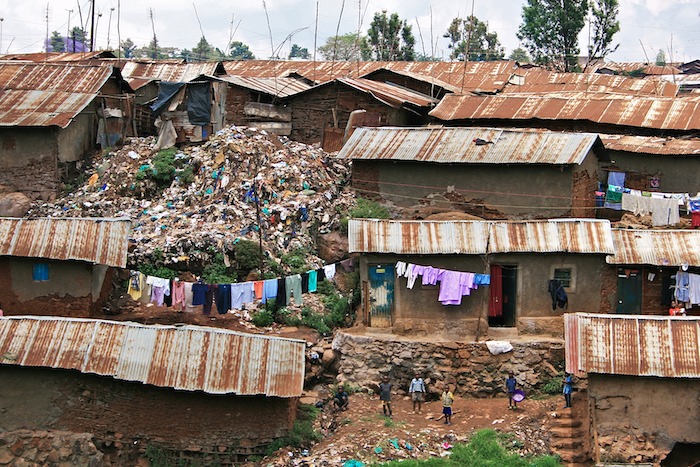As my flight approached Nairobi Airport, we flew low over miles of intermingled shanty towns, repair shops, and small factories literally as far as the eye could see. The colorful but chaotic landscape below was a reminder of why I had come. I was in Nairobi to deliver a presentation on behalf of the International Council of Chemical Associations (ICCA) at a ICCA-UNEP co-sponsored workshop on the challenges of managing chemicals in developing countries. The following are some of my thoughts on the role the chemical industry can play in aligning on strict industry standards for responsible care, and helping to build government capacity to do its part in making sure these standards are enforced.
 What are the challenges?
What are the challenges?
Nairobi exemplifies the difficulties inherent in working in many parts of the developing world where scientific calculations aren’t enough. Regulatory chaos, lazy bureaucracies, lack of government capacity, and corruption all require highly coordinated responses to create change. In these circumstances it takes more than a village, it takes an industry working together in constant dialogue with government and activist nonprofits, to make a stand on what the right thing is and making sure it gets done.
We in the chemical industry often struggle with how to assure faithful implementation and adherence to global standards at the local level—in Nairobi’s workshops, factories and shanty towns I saw from the air—in any country on Earth. Increasing amounts of hazardous chemicals are being imported from other developing countries (e.g., China) and safe chemicals management is a growing concern.
What is the ICCA and why does it matter?
The ICCA is the worldwide voice of the chemical industry. Its Responsible Care initiative encompasses a comprehensive EH&S management system comprised of a set of best practices for community awareness and emergency response, employee health and safety, pollution prevention, process safety, distribution safety, and chemical plant security. Included is a component referred to as the Global Product Strategy (GPS) which places emphasis on strengthening product safety and stewardship efforts to manage chemicals responsibly through their entire life-cycles.
Under ICCA leadership, ICCA Responsible Care and GPS have now spread to nearly 60 countries on six continents, including most recently China, India, the Middle East and Eastern Europe. It is the large multinational companies (e.g., BASF, Dow, Dupont, Braskem, Mitsubishi, etc) that are driving this spread of Responsible Care through sharing of their expertise and resources with smaller and medium sized companies, particularly in the developing world.
In 2011, ICCA and UNEP held a workshop in Nairobi with African country representatives to the Strategic Approach to International Chemicals Management (SAICM). This workshop introduced Responsible Care to the participants and helped to prioritize local needs for capacity building in EH&S and sustainability. Based on the output, the decision was made to conduct two pilot programs focusing on improving chemical transportation and warehousing safety in the countries of Kenya and Ghana and specifically at their respective ports of Mombasa and Tema. The ICCA Board of Directors subsequently committed industry experts and 300,000 Euros toward the completion of the pilot projects.
Follow-up workshops have been conducted during 2013 in Kenya and Ghana, the most recent being September 23 and 24 in Ghana’s port city of Tema. Expert speakers came from Dow, BASF, UNEP and the New Zealand Responsible Care organization.
The September workshop included a visit to the local Tema port which illustrated the very basic level of current chemical safety practices and identified opportunities for improvement. When conducting capacity building workshops it is important to understand the current level of chemical safety awareness and practice in order to tailor the training at the right level. In my experience, a tour of the facilities to witness how chemicals are actually being handled and to interview the workers about their level of understanding is essential due to the disconnect between what you are told by the management and actual practices on the shop floor. The tour of the Tema port was eye-opening for our team as it revealed only a basic level of understanding and practice and we have had to tailor our training accordingly
Two separate, four day events are planned for the first quarter of 2014 for the ports of Mombasa and Tema and will include workshops on chemical safety/dangerous goods handling, an analysis of current emergency response plans, and a hypothetical emergency response drill with all relevant stakeholders. ICCA has also been working with UNEP in Vietnam for the past two years to launch Responsible Care and GPS and to convince the local authorities of the need to strengthen the country’s chemicals management regulations using GPS as a potential model.
Conclusion
Multinationals are motivated by a strong desire to reduce incidents to protect human health and the environment, strengthen local regulations, enhance the reputation of the industry, and better level the competitive playing field. There is also interest in building government capacity wherever possible to do their part—especially when governments don’t have experience in standards setting and enforcement.
ICCA believes the most effective chemicals management results from a combination of strong regulation that’s science- and risk-based and is equitably enforced, and a voluntary industry effort, such as embodied in Responsible Care and GPS that goes above and beyond legally imposed safety requirements.
 What are the challenges?
What are the challenges?